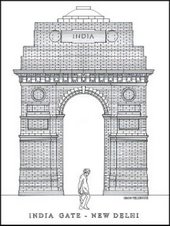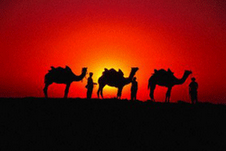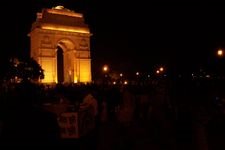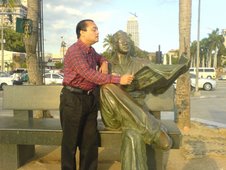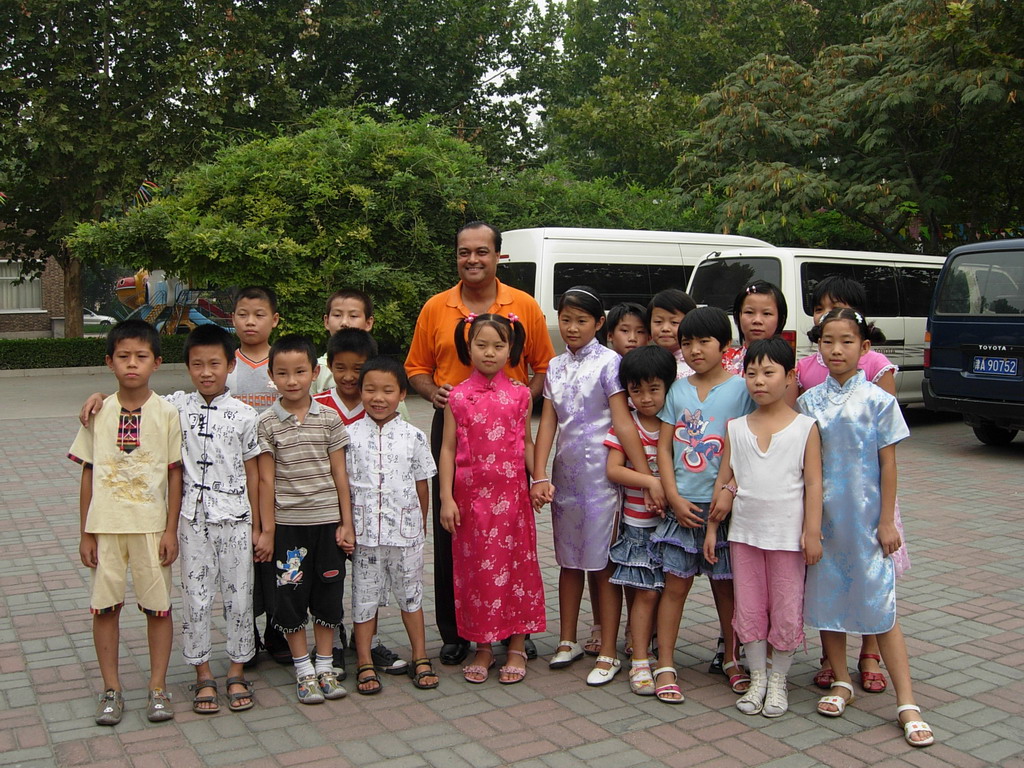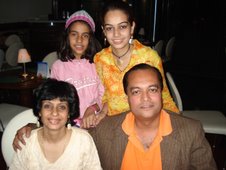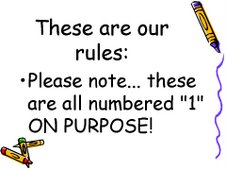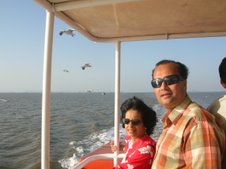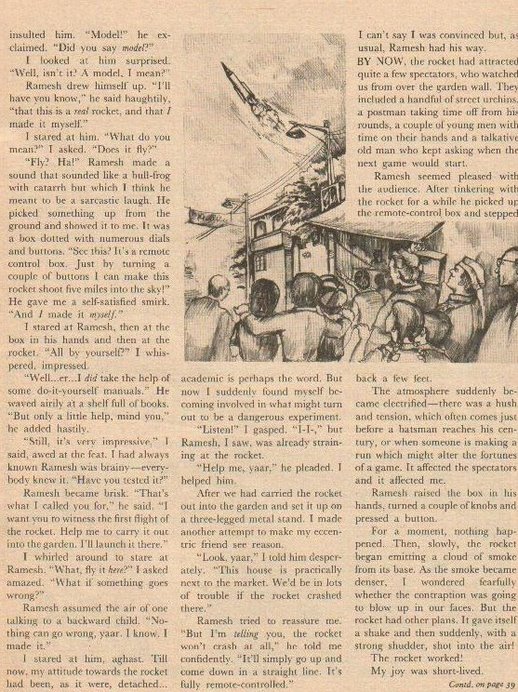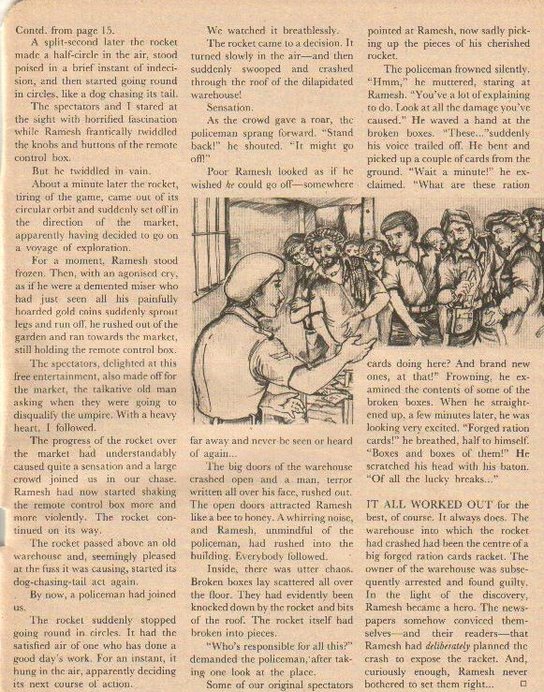 Part II: The Clue
Part II: The ClueThe story so far:
Ramesh and his friend are in Kolkata, the capital of the Indian province of Bengal, for the October holidays. They have been invited to celebrate Durga Puja in the old mansion of a friend of Ramesh’s uncle. All the members of this Bengali family have come home for the Pujas, as they always do, but Niranjan, the 15-year-old son of the house, explains sadly that it will probably be the last get-together since his father can no longer afford it. Ramesh excitedly explores the old house, and finds in the library a casket with a yellowing piece of paper inside. On it is written a poem in Bengali. Niranjan’s grandfather informs the boys that the poem was written by his own grandfather, during the colonial British rulers’ attempt to partition the province of Bengal. Niranjan remembers that there was a story about the family treasure being hidden in the house at that time. Later at lunch, Ramesh suddenly puts two and two together. He is sure that Niranjan’s great-great-grandfather has left behind a clue to that treasure!
Niranjan looked astounded. “What clue?” he exclaimed.
Ramesh put on his best Sherlock Holmes manner. “Didn’t your grandfather say,” he continued mysteriously, “that the lines written on the paper found in the library constitute the only poem your great-great-grandfather ever wrote in his life? Well, maybe he wrote it as a clue to where the treasure is hidden!”
My mouth fell upon. “Impossible!” I exclaimed.
“Why?” asked Ramesh quickly. “It’s certainly very possible and I think we should have a go at deciphering the poem.”
Niranjan nodded his head slowly. “How wonderful it’ll be if there really is a hidden treasure and we manage to discover it!” he exclaimed. “Let’s go up to the library!”
I made as if to protest, but seeing the determined look on the faces of the other two, decided to play along with them. Reluctantly discarding all thoughts of having a third helping of rice pudding, I followed Ramesh and Niranjan.
Once again we were in the library, Niranjan reading out the meaning of each line of the poem on the yellowing paper. “This is how it goes,” said Niranjan. “‘Neither summer nor winter…Mother has come home...beneath the peacock…number the petals…’”
There was a brief silence.
“Well,” I said, after a pause, “that sounds like a most unlikely clue to a hidden treasure.”
Ramesh looked pityingly at me. “Naturally, yaar!” he exclaimed. “If the message was obvious to one and all, then the hidden treasure wouldn’t be much of a secret, would it?”
Niranjan looked at Ramesh anxiously. “Can you decipher it?” he asked.
Ramesh put on his Sherlock Holmes manner again. “Well, let’s consider each line separately. What does the first line say? ‘Neither summer nor winter!’. The reference is clearly to the seasons. An in-between season, perhaps? There are two alternatives: spring and autumn. Maybe, the next line will make the picture clearer!”
“The next line says: ‘Mother has come home,” Niranjan repeated.
“Mother…” murmured Ramesh thoughtfully. “Whose mother?” His brow creased into a frown. “Reading the first two lines together, the poem is clearly referring to somebody’s mother who has come home either in the spring or in the autumn.”
My head was beginning to spin a little.
Niranjan broke in, his eyes sparkling. “Ramesh, what would you call the current season?” he asked.
“You mean now, in the month of October?” queried Ramesh. “Why, autumn, I suppose!”
Niranjan jumped to his feet. “Then the mother this poem is referring to must be Goddess Durga Ma!” he exclaimed excitedly. “She’s the mother Goddess who’s come to Earth. Every autumn, she descends from the Himalayas, where she lives with Lord Shiva, her husband, and comes to her father’s house for a visit. That’s what Durga Puja is all about!”
Ramesh stared at Niranjan and then his face broke into a wide smile. “That’s it, then!” he declared. “The message of the poem is clear! The treasure is hidden in the idol of the Goddess Durga!”
For a few seconds, nobody spoke. I stared at Ramesh in amazement. Niranjan broke the silence. “No” he said firmly. “The treasure is not hidden in the idol of Durga Ma.”
Ramesh looked puzzled. “How are you so sure?” he asked.
Niranjan smiled. “You jumped to the conclusion you did because you don’t know our customs,” he replied. “All the idols downstairs are only a few months old! Every year, on Bijoya Dashami – the fifth and last day of Durga Puja – all the idols, which have been worshipped during the previous four days, are taken to the banks of the river Ganges and immersed in the waters! This symbolizes Durga Ma’s return to her husband’s home after her short visit to her father’s house. So, you see, the idols used in my great-great-grandfather’s time have, long ago, sunk in the Ganges!”
Ramesh’s face fell. He looked like a cricketer who, having strode out jauntily to the wicket, suddenly discovers that he has forgotten to bring his bat. It was not often that Ramesh made a bloomer and the experience was clearly very painful to him.
“Anyway,” continued Niranjan, “from all accounts, my ancestors fled to Siliguri some time in the winter months. There would have been no idols then – either of Goddess Durga of her children – to hide treasures in!”
Ramesh looked apologetic. “I-uh-I didn’t know all this,” he said shamefacedly. “I was in too much of a hurry to jump to conclusions!”
“What does the next line say?” I asked. “Something to do with peacocks, I think?”
“Yes,” replied Niranjan. He looked at the yellowing paper in his hands. “It says: ‘Beneath the peacock’.” Niranjan looked puzzled. “What peacock?” he asked.
Ramesh’s brow creased into a frown. Then he snapped his fingers. “Do you have any pictures or engravings of peacocks in this house?” he asked.
Niranjan looked doubtful. “Not that I know of,” he replied. “If there was any such picture or engraving, I’m sure I would have noticed!”
“There must be!” insisted Ramesh. “And this peacock is, somehow, connected with Durga Puja!”
A sudden flash of light seemed to blaze upon Niranjan. He sat up with a jerk. “Of course!” he exclaimed.
Ramesh had the air of a policeman who knows that he is just a few minutes away from nabbing a gang of cat-burglars. “Where?” he asked quickly. “Where is this peacock?”
Niranjan composed himself. “I don’t know whether you noticed,” he began, “but each of the Gods and Goddesses downstairs is sitting is standing on some kind of a carrier. Durga Ma is on a lion. Lakshmi is on an owl. Saraswati is sitting on a swan. Ganesh is reclining on a rat. And Kartikeya, the God of Beauty, is sitting on a peacock!”
By now, even I had begun to feel the excitement of a hunter hot on a scent. “Wow!” I exclaimed. I looked at Niranjan excitedly. “What does the last line of the poem say?”
Niranjan once again raised the hundred-year-old scroll of paper. His hands, I saw, were trembling slightly. “The last line reads: ‘Count the petals’.”
Ramesh murmured to himself: “Beneath the peacock…count the petals…” He looked at Niranjan. “Tell me, what’s beneath the peacock downstairs?”
Niranjan slowly rolled up the scroll of paper in his hands. “The floor, of course!” he said finally. “What else?”
“No flowers?” asked Ramesh.
“Not that I know of.”
Ramesh got to his feet. “Well, I think we’ll have to take a close look at the idol of Lord Kartikeya,” he observed. “Let’s go down.
Niranjan quickly put the scroll back into its box and returned it to the bookshelf. We hurried down.
The afternoon puja (prayer service) had ended. Prasad (portions of sweets and fruits that had been offered to the gods) was being distributed to the worshippers by one of the priests. As we moved towards the marble platform on which the idols stood, the priest beckoned us to take some prasad.
Niranjan remembered his duties as a host. “Yes, take some prasad,” he said, and piloted us towards the priest.
I cupped my hands and received a packet of sweets and fruits. Ramesh also cupped his hands and the priest handed him a packet of prasad, too.
Ramesh did not move.
I stared in amazement at my bespectacled friend, who seemed to have suddenly frozen into a statue, his arms still upraised, the packet of prasad in his cupped hands.
“Ramesh!” I hissed. “What’s up?”
Ramesh was staring at the marble platform behind the priest. There was a glazed look in his eyes.
I nudged Ramesh. “What’s wrong?” I exclaimed.
Ramesh came to life. He pointed to the marble platform in front of us. I looked at the surface of the marble platform.
And then I understood.
Carved out of the surface of the marble platform was an intricate design of loops and circles and, at frequent intervals, beautifully engraved flowers. I grabbed Niranjan’s arm. “Look at the designs!” I exclaimed. “Don’t they cover the entire platform?”
“They sure do!” replied Niranjan, equally excited.
Ramesh quickly grabbed both Niranjan and me by the arms and motioned us to follow him. We quickly moved to a quiet corner of the hall. “Listen,” said Ramesh quickly, looking at Niranjan. “Are those idols always arranged the way they are now? I mean, every year – year after year?”
“Yes,” replied Niranjan, catching the drift. “Kartikeya is always placed to the left of Saraswati who is always left of Durga. And, the idols are always placed in the slight semi-circle that you see now.”
“That means,” concluded Ramesh triumphantly, “that earlier idols of Kartikeya must have covered the same flower which the present idol has been placed over!”
“Yes,” agreed Niranjan, nodding his head vigorously.
“Then that engraved floor is the one the poem is referring to!” cried Ramesh with a victorious smile.
“You must be right,” I agreed. “But the poem talks of counting the petals of the flowers. What’ll we achieve by doing that?”
“I don’t know,” said Ramesh impatiently. “Not yet, anyway. We must do things one step at a time.” He looked at Niranjan. “First, we must uncover the flower.”
Niranjan looked doubtful. “That will mean moving the idol of Lord Kartikeya. I’m not sure we’ll be allowed to do that.”
I broke in hastily. “There’s really no hurry, you know.” I said quickly. “The idols will be here for only four more days. Then, they’ll be taken to the river and immersed. After that we can spend all the time we want inspecting the engraved flower.”
Niranjan looked at Ramesh. “That makes sense,” he said.
Ramesh looked uncertain for a moment and then gave in. “Well, if there is a hundred-year-old hidden treasure,” he said, with a half-hearted smile,” I guess it can wait another four days to be discovered!”
The next four days must have been the longest Ramesh had ever lived through. Impatient by nature, he could barely control his excitement at the thought of being on the threshold of a major discovery. The delay irritated him and he wore the air of a wild beast straining at a leash.
I, on the other hand, enjoyed the Durga Puja festivities thoroughly – the morning and evening pujas (prayers), the drumming, the gongs, the chanting, the incense, the Prasad, the meals, the variety and cultural programmes, the people, the comings and goings and the visiting of other centres of worship in other parts of the city, all kept me preoccupied and in a sort of happy trance. I did not, of course, forget about our search for the hidden treasure, but I did not give it much thought during those four hectic days.
Finally, Bijoya Dashami, the last day of Durga Puja, arrived. Ramesh’s uncle, Ramesh and I accompanied the Mukherjee household, in procession, to the banks of the river Ganges. There we saw the five idols, along with hundreds of other idols from all over Kolkata, being immersed in the waters of the holy river.
We returned to the Mukherjee house, everybody a little sadthat the festivities were finally over. Ramesh, Niranjan and I immediately made a bee-line for the marble platform in the hall. We mounted the steps and rushed over to the spot where the idol of Kartikeya had stood. Sure enough, on the exact spot where the idol of the God of Beauty and his peacock had stood, was an engraved flower!
I stared at the flower and did a quick count. “The flower has nine petals,” I said. “What are we supposed to do now?”
You could almost hear the machinery of Ramesh’s brain working overtime.
“The poem tells us to count the petals,” he observed. “But the number of petals – nine—doesn’t seem to carry any message. My guess is that we’re supposed to do something while counting the petals!”
Nirnanjan looked thoughtful. “Maybe we’re expected to touch the petals?” he suggested.
Ramesh’s face lit up. “Of course!” he exclaimed. “That’s how hidden safes and trapdoors are opened in detective stories! We must press each petal! That’ll release the concerned springs!”
With Ramesh, thought is always quickly followed by action. He crouched over the engraved flower petals and pressed them one after the other.
Nothing happened. What an anti-climax!
“Try again,” urged Niranjan. “You might not have got the right petal to start with. Maybe there’s a certain sequence!”
It was on the third round that our patience was rewarded. Ramesh had pressed all the petals, one by one, in a different sequence than his earlier tries, when, suddenly, with a tiny whirring sound, a small portion of the marble floor a little above the engraved flower slid to one side revealing a gaping hole!
We could see three bags inside the hole!
Niranjan lowered his arms into the hole and lifted out of one of the three bags. The cloth bag, rotten with age, came to pieces in his hands and a glittering mass of gold and silver ornaments fell to the floor!
We stared at this dazzling spectacle for a few seconds, our breathing suspended. Then, Ramesh quickly lifted out another bag. This, too burst and a pile of gold and silver coins poured out!
Niranjan was lifting out the third bag when I heard footsteps and, raising my head, saw Mr. Mukherjee and Ramesh’s uncle hurrying towards us.
“Aren’t you boys coming up to have dinner?” asked Mr. Mukherjee. Then his eyes fell on the dazzling array of glittering wealth around us and both he and Ramesh’s uncle stopped in their tracks in amazement.
“What – what is all this?” stammered Mr. Mukherjee, his eyes nearly popping out of his head.
Niranjan slowly got to his feet. He smiled broadly. “Father, we can celebrate Durga Puja again next year,” he said quietly but with a note of triumph in his voice, “and for many, many more years to come! The gods have shown us the way...”




